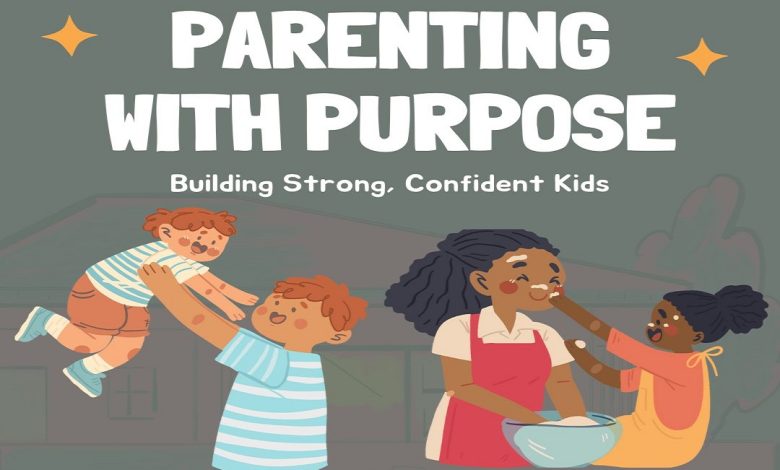Parenting Strategies – Power Words for Success

Elevate your parenting experience with our curated strategies and power words for success. Unlock a new level of harmony and accomplishment within your family.
Positive parenting strategies are essential for nurturing, protecting, and guiding children, preparing them for independence. Different researchers have categorized parenting styles into authoritarian, authoritative, permissive, and uninvolved, each employing a unique approach to child-rearing.
In today’s fast-paced world, parenting can be challenging. Parents often face the task of striking a balance between nurturing their children and setting boundaries. With so many different parenting strategies and styles out there, it can be overwhelming to figure out what works best for your family.
However, understanding the different approaches and their effects on children can help parents make informed decisions. This article will explore four main parenting categories: authoritarian, authoritative, permissive, and uninvolved. By gaining insight into these strategies, parents can develop an effective parenting style that promotes their child’s well-being and development. It’s time to take a closer look at positive parenting strategies and find the best fit for your family.
We already briefly discussed positive parenting in our previous blog. If you missed it, then you can check it here.
Understanding Different Parenting Styles
Understanding different parenting styles is essential for effective parenting strategies. These include authoritarian, authoritative, permissive, and uninvolved, each employing unique approaches to raising children. By adopting the appropriate style, parents can nurture, guide, and prepare their children for independence.
Introduction To Parenting Styles
Understanding different parenting styles is crucial for every parent, as it helps create a framework for effective child-rearing. Parenting styles refer to the various approaches that parents use to raise their children. Each parenting style comes with its own set of beliefs, values, and behaviors that shape the parent-child relationship.
The Importance Of Identifying Your Parenting Style
Identifying your parenting style is a crucial step towards creating a healthy and nurturing environment for your children. The way you interact with and guide your children significantly influences their emotional well-being, behavior, and overall development. Understanding your parenting style allows you to make intentional choices that align with your values and contribute to positive parent-child relationships.

1. Impact on Child Development:
Identifying your parenting style provides insight into how your approach affects your child’s growth. Different styles can shape a child’s self-esteem, social skills, and ability to handle challenges.
2. Building a Strong Foundation:
Your parenting style serves as the foundation for your child’s sense of security and trust. By identifying your style, you can ensure that your child feels supported, valued, and emotionally connected.
3. Communication and Connection:
Knowing your parenting style enables you to refine your communication strategies. Effective communication is key to building a strong connection with your child, fostering trust, and encouraging open dialogue.
4. Consistency and Boundaries:
Understanding your style helps you establish consistent rules and boundaries. Consistency provides a sense of predictability for your child, promoting a stable and secure environment.
5. Tailoring Parenting Strategies:
Identifying your parenting style allows you to tailor your strategies to meet your child’s unique needs. This personalized approach enhances your ability to address challenges and celebrate successes effectivel
6. Cultivating Positive Behavior:
Your parenting style influences how you respond to your child’s behavior. By recognizing your style, you can adopt positive discipline techniques that encourage responsible behavior and foster a sense of accountability.
7. Self-Reflection and Growth:
Examining your parenting style prompts self-reflection and growth. It allows you to assess areas where you can refine your approach, learn from experiences, and continuously strive to become a more effective and supportive parent.
8. Empowering Parental Confidence:
Understanding your parenting style boosts your confidence as a parent. It provides clarity on your strengths and areas for improvement, empowering you to navigate the challenges of parenting with greater assurance.
9. Creating Lasting Memories:
Your parenting style shapes the quality of your relationship with your child. By identifying and embracing your style, you contribute to creating positive, lasting memories that form the basis of a strong parent-child bond.
10. Preparing for Parenting Challenges:
Understanding your parenting style prepares you for the inevitable challenges of parenting. It equips you with the knowledge and resilience needed to navigate difficulties while maintaining a supportive and loving environment.
Overview Of Authoritarian Parenting
Authoritarian parenting is a parenting style characterized by high demands and low responsiveness. In this approach, parents tend to set strict rules and expectations for their children, emphasizing obedience and discipline. Authoritarian parents typically have a clear set of rules and expectations, and they expect their children to follow these rules without much room for negotiation or discussion.
Key features of authoritarian parenting include:
- High Expectations: Authoritarian parents have high standards for their children’s behavior and academic performance. They often set specific rules and expect obedience without questioning.
- Limited Flexibility: Authoritarian parents are less likely to be flexible or responsive to their children’s needs or opinions. Decisions are typically made by the parent without much input from the child.
- Discipline and Punishment: Discipline is a central aspect of authoritarian parenting, and consequences for breaking rules are often strict. Punishments may include timeouts, loss of privileges, or other forms of discipline to ensure compliance.
- Communication Style: Communication in authoritarian parenting tends to be one-way, with parents giving instructions and expecting children to follow them. There may be less emphasis on open dialogue and explanation.
- Controlled Environment: Authoritarian parents often seek to control the home environment to create a structured and disciplined atmosphere. This can involve monitoring and directing many aspects of the child’s life.

While authoritarian parenting can create well-behaved and achievement-oriented children, it also has potential drawbacks. Children raised in authoritarian households may struggle with decision-making, have lower self-esteem, and be more prone to rebellion or anxiety. It’s important to note that parenting styles can vary, and the effectiveness of any style depends on factors such as the child’s temperament and the cultural context in which the parenting occurs.
Overview Of Authoritative Parenting
Authoritative parenting combines firm boundaries with warm and responsive parenting. It values open communication, encourages independence, and promotes a healthy balance of discipline and support. Parents who adopt this style set clear expectations while also nurturing their child’s autonomy and decision-making skills.
Key features of authoritative parenting include:
- Clear Expectations: Authoritative parents establish clear and reasonable expectations for their children’s behavior. Rules are communicated and enforced, providing structure and consistency.
- Open Communication: Communication is a two-way street in authoritative parenting. Parents encourage their children to express their thoughts and feelings, fostering open dialogue and understanding.
- Nurturing and Supportive: Authoritative parents are responsive to their children’s emotional needs. They provide warmth, support, and encouragement, creating a secure and loving environment.
- Encouragement of Independence: This parenting style promotes the development of independence and decision-making skills. Children are given the opportunity to make choices within reasonable limits.
- Positive Discipline: Discipline in authoritative parenting focuses on teaching and guiding rather than punitive measures. Consequences for misbehavior are explained, and parents emphasize the importance of understanding and learning from mistakes.
- Flexibility: Authoritative parents recognize the importance of flexibility. They are willing to adapt their parenting strategies to the evolving needs and developmental stages of their children.
- Emphasis on Education: Education is highly valued in authoritative parenting. Parents actively engage in their children’s learning experiences, fostering a positive attitude towards education and curiosity.
Authoritative parenting has been associated with numerous positive outcomes for children, including higher self-esteem, better academic performance, and improved social skills. This parenting style is considered effective because it combines structure with warmth, allowing children to thrive in a supportive and empowering environment.
Overview Of Permissive Parenting
Permissive parenting is a style characterized by high warmth and responsiveness but low demands and expectations for a child’s behavior. In this approach, parents are nurturing and affectionate, often avoiding the use of strict rules or discipline. Permissive parents tend to be lenient and indulgent, allowing their children significant freedom in decision-making.
Key features of permissive parenting include:
- High Warmth and Affection: Permissive parents are typically warm, loving, and emotionally responsive to their children. They seek to create a positive and supportive emotional environment.
- Low Demands and Expectations: Unlike more structured parenting styles, permissive parents set fewer rules and have relaxed expectations regarding their children’s behavior. This approach often involves minimal control over daily routines or chores.
- Avoidance of Strict Discipline: Permissive parents are hesitant to enforce strict discipline. Instead of using consequences for misbehavior, they may be more inclined to avoid confrontation or emphasize reasoning and explanation.
- Encouragement of Independence: This parenting style encourages independence and autonomy in children. Permissive parents may allow their children significant freedom to explore and make decisions without extensive guidance.
- Limited Structure: Permissive households may lack a structured routine or consistent rules. This can lead to an environment where children may not have clear expectations, potentially impacting their sense of security.
- Friendship Approach: Permissive parents may adopt a more friend-like relationship with their children, seeking to be approachable and avoid the traditional parent-authority dynamic.
- Potential for Indulgence: Due to the lack of strict rules, permissive parents may indulge their children’s desires or requests, sometimes leading to issues related to entitlement.
While permissive parenting can foster a warm and nurturing environment, it also has potential drawbacks. Children raised in permissive households may struggle with self-control, have difficulty following rules, and may face challenges in handling authority figures. Striking a balance between warmth and structure is often key to effective parenting, aligning with the concept of authoritative parenting.
Overview Of Uninvolved Parenting
Uninvolved parenting, also known as neglectful parenting, is a style characterized by a lack of responsiveness and engagement with a child’s emotional and developmental needs. In this approach, parents provide minimal guidance, attention, and support, often leaving children to navigate their lives independently.
Key features of uninvolved parenting include:
- Emotional Distance: Uninvolved parents tend to be emotionally distant and detached from their children. They may not actively seek to understand or address their child’s emotional needs.
- Limited Communication: Communication in uninvolved parenting is often minimal. Parents may not engage in regular conversations with their children, resulting in a lack of emotional connection and understanding.
- Low Responsiveness: Uninvolved parents are generally unresponsive to their child’s day-to-day activities, interests, and concerns. This lack of engagement can leave children feeling neglected.
- Limited Guidance and Support: Uninvolved parents provide minimal guidance and support for their children’s educational, social, and personal development. This lack of involvement can hinder a child’s ability to navigate challenges.
- Minimal Rule-Setting: Uninvolved parents may set few, if any, rules or expectations for their children’s behavior. This absence of structure can lead to uncertainty and confusion for the child.
- Neglect of Basic Needs: In extreme cases, uninvolved parents may neglect their children’s basic needs, such as food, clothing, and shelter. This can have severe consequences for a child’s overall well-being.
- Limited Presence: Uninvolved parents may be physically present but emotionally absent. They may be preoccupied with their own concerns, leaving the child feeling neglected or overlooked.
- Potential for Self-Reliance: Children raised in an uninvolved parenting environment may develop self-reliance out of necessity as they learn to navigate life without significant parental guidance or support.
Uninvolved parenting can have profound and lasting effects on a child’s emotional and psychological well-being. Children raised in such environments may struggle with forming secure attachments, have difficulties in social relationships, and exhibit emotional and behavioral challenges. It is important to note that while uninvolved parenting is a distinct style, degrees of involvement can vary, and the impact on children may differ based on the severity and duration of the neglect.
Building Better Communication With Your Child
Effective communication is key to building a strong and positive relationship with your child. When you establish open lines of communication, you create an environment where your child feels safe expressing their thoughts, feelings, and concerns. This not only strengthens your bond but also allows you to effectively guide and support your child as they navigate through life’s challenges. In this article, we will explore the power of positive communication, effective ways to communicate with your child, active listening techniques for parents, and how to create a safe and supportive environment for open communication.
The Power Of Positive Communication
Positive communication is essential to fostering a healthy parent-child relationship. It involves using words, tone of voice, and body language that convey warmth, understanding, and respect. By employing positive communication, you create an atmosphere of trust and mutual respect, encouraging your child to open up and share their experiences with you.
Effective Ways To Communicate With Your Child
When it comes to communicating with your child, it’s important to consider their age, temperament, and individual needs. Here are some effective strategies to enhance communication:
- Set aside dedicated time for one-on-one conversations with your child. This uninterrupted time allows both of you to focus on each other without distractions.
- Listen actively to your child’s thoughts, ideas, and concerns. Show genuine interest and validate their emotions by reflecting their words back to them.
- Use age-appropriate language and explanations to ensure your child understands the topic of discussion.
- Encourage your child to express their opinions and feelings freely without fear of judgment or criticism.
- Practice empathy by putting yourself in your child’s shoes and trying to understand their perspective.
Active Listening Techniques For Parents
Active listening is a vital skill that parents can develop to improve their communication with their child. It involves fully concentrating on what your child is saying, understanding their message, and responding in a thoughtful and empathetic manner. Here are some active listening techniques you can apply:
- Give your child your undivided attention by maintaining eye contact and eliminating distractions.
- Provide verbal and non-verbal affirmations, such as nodding or saying “I understand” to show that you are actively listening.
- Ask open-ended questions to encourage your child to elaborate on their thoughts and feelings.
- Paraphrase and summarize your child’s words to ensure you have understood their message correctly.
- Avoid interrupting and allow your child to finish speaking before responding.
Creating A Safe And Supportive Environment For Open Communication
To foster open communication, it is crucial to create a safe and supportive environment where your child feels comfortable sharing their thoughts and experiences. Here are some ways you can cultivate such an environment:
- Be approachable and non-judgmental. Let your child know that they can come to you with any concern or problem without fear of punishment or ridicule.
- Respect your child’s boundaries and privacy. Avoid prying or invading their personal space unless they willingly choose to share.
- Encourage dialogue by initiating discussions about their day, their interests, and current events. Show interest and actively listen to their responses.
- Validate your child’s feelings and opinions, even if they differ from your own. This helps them develop a sense of self-worth and self-expression.
- Model effective communication by expressing your own thoughts and emotions openly and respectfully. Children learn by observing and imitating their parents’ behavior.
Building better communication with your child requires effort, patience, and consistency. By implementing these strategies and creating a nurturing environment, you can strengthen your relationship and empower your child to become a confident communicator in all aspects of their life.
Encouraging Positive Behavior In Your Child
Parenting is a challenging yet fulfilling journey. One of the most important tasks as a parent is to encourage and shape positive behavior in your child. By doing so, you not only promote their well-being but also set them up for success in the future. In this article, we will explore effective strategies to help you achieve this goal.

How To Set Clear Expectations And Rules
Setting clear expectations and rules is crucial to guiding your child’s behavior. By establishing consistent boundaries, you create a sense of structure and security. Here are some tips on how to set clear expectations:
- Communicate openly: Clearly explain your expectations to your child. Use simple language and ensure they understand what is expected of them.
- Be specific: Instead of saying “Behave yourself,” provide specific guidelines such as “Use polite words” or “Clean up after playtime.”
- Lead by example: Children learn by observing their parents. Be a role model by demonstrating the behaviors you expect from them.
- Implement consequences: Clearly communicate the consequences of not following the rules. Consistently enforce consequences to reinforce the importance of positive behavior.
The Role Of Positive Reinforcement In Shaping Behavior
Positive reinforcement is a powerful tool for encouraging positive behavior in your child. It involves acknowledging and rewarding their good behavior, which motivates them to continue behaving in a similar manner. Here’s how you can utilize positive reinforcement:
- Praise and acknowledge: Whenever your child displays positive behavior, praise and acknowledge their efforts. Show genuine appreciation for their actions.
- Reward system: Establish a reward system where your child can earn points or tokens for good behavior. These rewards can be exchanged for privileges or small incentives.
- Quality time: Spending quality time with your child is an excellent form of positive reinforcement. Engage in activities they enjoy, showing them that their good behavior leads to fun experiences with you.
- Verbal encouragement: Use positive and encouraging words to motivate your child. Let them know you believe in their ability to make good choices.
Strategies For Dealing With Negative Behavior
Dealing with negative behavior is a crucial aspect of parenting. It’s important to address these behaviors promptly and effectively. Here are some strategies to handle negative behavior:
| Strategy | Description |
|---|---|
| Time-out | Set a designated spot where your child can calm down and reflect on their actions. |
| Redirecting | Distract your child from negative behavior by redirecting their attention to a more positive activity. |
| Logical consequences | Connect the consequence to the behavior, allowing your child to understand the impact of their actions. |
| Effective communication | Calmly communicate with your child, discussing the negative behavior and its consequences. Encourage them to reflect on their actions. |
Teaching Problem-solving Skills To Your Child
Teaching your child problem-solving skills is important for them to navigate challenges and make good decisions. Here are some ways to teach problem-solving:
- Encourage creativity: Provide opportunities for your child to think creatively and come up with solutions to problems.
- Role-playing: Engage in role-playing scenarios where you can guide your child in resolving conflicts or making choices.
- Active listening: Teach your child the importance of listening to others during problem-solving situations.
- Break it down: Help your child break down complex problems into smaller, more manageable steps.
By implementing these strategies and fostering a positive environment, you can empower your child to develop good behavior and problem-solving skills that will benefit them throughout their lives.
Nurturing Emotional Intelligence In Your Child
Discover effective parenting strategies to nurture emotional intelligence in your child. Learn how positive communication, structure, and rules can encourage good behavior and decrease misbehavior, ultimately preparing your child for independence and emotional well-being. Find out how different parenting styles, such as authoritarian, authoritative, permissive, and uninvolved, can impact your child’s development and learn the best approaches that suit your family’s needs.

The Importance Of Emotional Intelligence
Emotional Intelligence (EI) is a crucial skill for children to develop as it impacts various aspects of their lives, from social relationships to academic success. Research has shown that individuals with high EI are more empathetic, resilient, and better equipped to handle stress. Therefore, nurturing emotional intelligence in your child is essential for their overall well-being and future success.
Understanding And Validating Your Child’s Emotions
Understanding and validating your child’s emotions is a vital aspect of nurturing their emotional intelligence. When your child expresses emotions, such as anger, sadness, or frustration, it is essential to acknowledge and validate their feelings. This validation helps your child feel understood and accepted, fostering a sense of emotional security.
By actively listening to your child and providing empathetic responses, you create an environment where they can freely express their emotions without fear of judgment. Encouraging open communication and creating a safe space for your child to share their feelings not only strengthens your bond but also helps them develop self-awareness and emotional regulation skills.
Teaching Empathy And Compassion
Empathy and compassion are key components of emotional intelligence. Teaching your child these values helps them develop strong interpersonal skills and fosters positive relationships with their peers and others. Encourage your child to put themselves in others’ shoes, teaching them to consider the feelings and perspectives of others.
One effective way to promote empathy is through modeling. Show your child empathy and compassion in your own interactions with others. Explain the importance of understanding and caring for others’ emotions. Engage in activities that promote empathy, such as volunteering or participating in acts of kindness, both at home and in the community.
Helping Your Child Develop Emotional Resilience
Emotional resilience is an essential aspect of emotional intelligence. It enables individuals to bounce back from adversity, cope with stress, and maintain a positive outlook. As a parent, you can help your child develop emotional resilience by providing support and guidance during challenging times.
Encourage your child to embrace setbacks and failures as opportunities for growth and learning. Teach them problem-solving skills and help them develop a positive mindset. By emphasizing the importance of perseverance and optimism, you empower your child to develop emotional resilience and overcome obstacles.
Additionally, ensure your child has a strong support system in their life, including family, friends, and mentors. Building a network of supportive relationships helps your child navigate difficulties and enhances their emotional well-being.
Instilling Discipline And Boundaries
The Role Of Discipline In Parenting
Discipline plays a crucial role in parenting as it helps shape a child’s behavior and instills valuable life skills. By setting clear expectations and boundaries, parents can guide their children towards positive behaviors and teach them the importance of self-control and accountability.
Effective Discipline Strategies
Positive reinforcement: Instead of focusing on punishment, using positive reinforcement can be highly effective in encouraging good behavior. Praising and rewarding your child for their efforts and achievements reinforces positive behavior and motivates them to make better choices in the future.
Consistency: Consistency is key when it comes to discipline. Establishing consistent rules and consequences helps children understand what is expected of them and promotes a sense of fairness. It is important for parents to enforce these rules consistently and follow through with appropriate consequences when necessary.
Communication: Open and effective communication is essential in disciplining children. It helps parents explain their expectations and reasoning behind rules, allowing children to understand the logic and importance behind them. This promotes a sense of understanding, respect, and cooperation between parents and children.
Setting And Enforcing Boundaries
Clear expectations: Setting clear boundaries and expectations helps children understand what is acceptable behavior and what is not. It is important for parents to clearly communicate these expectations and consistently reinforce them.
Consequences: When boundaries are crossed, it is essential to enforce appropriate consequences. Consequences should be age-appropriate, fair, and related to the misbehavior. This helps children understand the consequences of their actions and learn from their mistakes.
Positive discipline: Instead of resorting to punitive measures, positive discipline focuses on teaching and guiding children towards appropriate behavior. This approach emphasizes problem-solving, logical consequences, and constructive communication, fostering a healthy parent-child relationship built on respect and understanding.
Teaching Responsibility And Accountability To Your Child
Lead by example: Children learn best by observing their parents’ behavior. By modeling responsible and accountable behavior, parents can instill these values in their children. Show them how to take ownership of their actions, apologize when necessary, and make amends.
Assign age-appropriate tasks: Giving children age-appropriate responsibilities helps them develop a sense of competence and accountability. Whether it’s chores around the house or managing their own homework, allowing children to take on responsibilities teaches them the importance of being accountable for their actions.
Encourage problem-solving: Empowering children to find solutions to their own problems helps promote accountability. Encourage them to think critically, evaluate their actions, and come up with solutions to address their mistakes or misbehaviors. This fosters self-reflection and enables them to take responsibility for their actions.

Credit: www.amazon.com
Frequently Asked Questions Of Parenting Strategies
What Are The 4 Types Of Parenting Styles?
The four main parenting styles are authoritarian, authoritative, permissive, and uninvolved. Each style has a unique approach to raising children.
What Are The Different Parenting Strategies?
There are four main parenting strategies: authoritarian, authoritative, permissive, and uninvolved. Each strategy has a unique approach to raising children. Researchers have grouped parenting styles into different categories, but these four are commonly discussed in child psychology today.
What Are The 5 Positive Parenting Skills?
The five positive parenting skills are nurturing, guiding, protecting, preparing for independence, and encouraging good behavior. These skills help parents raise confident and well-behaved children.
What Are The 4 P’s Of Parenting?
The 4 P’s of parenting are authoritarian, authoritative, permissive, and uninvolved. Each style has a unique approach to raising children.
Conclusion
In today’s world, parenting plays a crucial role in shaping the future of our children. By incorporating positive parenting strategies, parents can provide a strong foundation for their children’s growth and development. These strategies involve nurturing, protecting, and guiding them towards independence.
It is important to encourage good behavior, communicate effectively, and establish clear rules and structure. Different parenting styles exist, such as authoritarian, authoritative, permissive, and uninvolved, each with its own unique approach. By understanding and implementing these strategies, parents can confidently raise their children and create a positive environment for their well-being.

Tanjer, with over a decade of experience in parenting and child development, is renowned for his expertise in these fields. His work, deeply rooted in research and practical application, focuses on nurturing young minds and fostering a love for learning. Tanjer’s approach, characterized by empathy and tailored advice, aims to positively impact the lives of children and their families.


